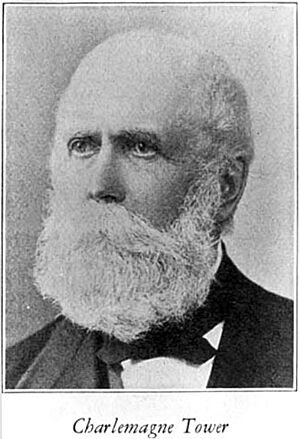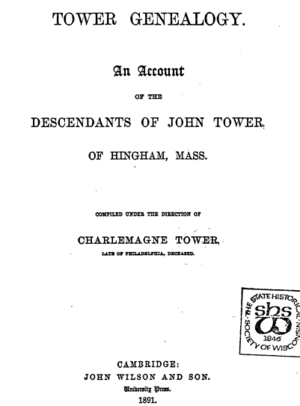Charlemagne Tower facts for kids
Charlemagne Tower (born April 18, 1809 – died July 25, 1889) was an American lawyer and businessman. He was very active in buying land in Pennsylvania's Schuylkill Valley. He also worked as an officer for coal and railroad companies. During the American Civil War, he led a company of Union soldiers from Pottsville as a captain. After the war, he bought large areas of land in the Midwest and Northwest from the Northern Pacific Railroad.
Contents
Early Life and Law Career
Charlemagne Tower was born on April 18, 1809, in Paris, New York. He was the oldest of eight children. His father, Reuben Tower, was a New York State Legislator.
Charlemagne went to Oxford Academy and then Clinton and Utica Academies. At age 14, in 1824, he taught school in Oneida County. The next year, he became an assistant teacher at Utica Academy. He then went to Harvard University in 1827 and graduated in 1830.
His family moved to Waterville, New York. Their home is now a historic landmark. After graduating, Tower trained to be a lawyer in Albany, New York. He returned to Waterville in 1832 after his father passed away. He then opened his own law practice there in 1836.
Work in Pennsylvania
In 1846, Tower moved to Orwigsburg, Pennsylvania. He worked on legal issues about land that had large coal and mineral deposits. While there, he married Amelia Malvina Bartle in 1847. They had seven children together.
Tower moved his law practice to Pottsville, Pennsylvania, in 1850. This city became the Schuylkill County seat. He became very wealthy and respected by handling many land ownership disputes. One of his most famous cases was the Munson-Williams affair. This case took almost 25 years to finish.
The Munson-Williams Land Case
Soon after moving to Pottsville, Tower started buying land with large coal deposits. He worked with Alfred Munson to secure these lands. Their plan was to create one large property for mining. Tower used his legal skills to clear up any old claims or disputes on the land.
They worked secretly so others wouldn't buy the land first. Tower bought the land and put the titles in other people's names. This hid their true ownership. By 1858, Tower and Munson owned 11,000 acres (45 square kilometers). Once their plan became known, many people with small claims to the land started lawsuits. Tower's legal skills kept their project from failing.
In 1867, Tower decided to sell the lands. But he couldn't find a buyer because of the unclear titles. So, he decided to develop the land for coal mining instead. In 1868, he leased 1,503 acres (6.08 square kilometers) to two coal companies. They paid him 30 cents for each ton of coal mined. Two coal mines, the Tower and the Brookside, were built on the land.
Near the mines, Tower started building a small town. It was named Tower City when it was first surveyed. He planned the town and rented lots to settlers.
Later, Franklin Gowen, the President of the Reading Railroad, wanted to buy coal lands. He was trying to create a large coal company. Tower sold his lands to Gowen for $3 million. Tower made a profit of $1.5 million from this sale.
Civil War Service
When the Civil War began in April 1861, Charlemagne Tower quickly acted. Within ten days, he gathered about 270 men from Schuylkill County. They joined the Union Army for three months. This group was called the "Tower Guards." They became Company H of the 6th Pennsylvania Regiment. Tower was made captain and paid for their uniforms and weapons himself.
His unit fought in the Battle of Falling Waters in July 1861. This was a Union victory. When their service ended, the soldiers gave Tower a ceremonial sword. This showed their respect for him.
In April 1863, Tower became the Provost Marshal for Schuylkill County. His job was to draft men for the military. This was a very unpopular task. He and his helpers received many threats. The draft was strongly resisted by farmers and miners in the county. Tower was given two companies of soldiers to help him.
When a large group of about 3,000 people gathered to protest, Tower marched his armed men into the crowd. He seized those who had been drafted and made them join the army. During his time as Provost Marshal, he drafted 20,000 men. President Lincoln praised him for this work.
Tower remained Provost Marshal until April 1864. He also worked to stop labor protests by miners. He believed these protests were disloyal to the Union. Troops stayed in Schuylkill County throughout the war.
After the war, he joined the Military Order of the Loyal Legion of the United States.
After the War
After his Civil War service, Tower continued his law practice in Pottsville. In 1875, he moved to Philadelphia. He started several new businesses. He owned the Honeybrook Coal Company. He also joined the board of directors for the Northern Pacific Railway.
In the early 1870s, the Northern Pacific Railway faced financial problems. They had to sell much of their land in the upper Midwest. Tower bought large areas of land in Minnesota, North Dakota, and Washington state.
Work in the Midwest
Tower City, North Dakota
In 1878, a man named George Ellsbury became interested in Tower's land in North Dakota. Ellsbury was a real estate agent. He thought the area called Spring Tank would be a good place for a new town. He contacted Tower, who hired him as a land agent. Ellsbury earned a commission on all land sold to farmers.
Ellsbury bought Spring Tank in January 1879. He planned the town, which was named Tower City after Charlemagne Tower. Tower had asked Ellsbury to name it after himself. But Ellsbury thought Tower's name was more famous and important.
Tower University
Ellsbury wanted to make Tower City more important. He tried to get it named the capital of Dakota Territory, but failed. So, he decided to open a new university named after Tower. He met with Baptist leaders who wanted to start a college. Ellsbury promised them a $100,000 donation from Charlemagne Tower if they built the college in Tower City. They agreed, and construction began in 1884.
However, Tower did not donate the promised amount. He gave $4,500 in cash and a library of 1,500 books. Local residents raised another $5,000. The first classes began in a hotel in 1886 with 30 students. The next year, enrollment dropped, and the college closed.
Vermilion Range Iron Ore
In 1865, a geologist found gold and silver near Lake Vermilion in northern Minnesota. This started a short "gold rush." While people looked for gold, others found rich iron ore deposits. George C. Stone, a banker, heard about large ore deposits in the Mesabi Range. In 1873, he met with Tower to discuss the land.
Tower allowed an exploration trip to the Mesabi. His son-in-law, R.H. Lee, and Professor Albert Huntington Chester went with Stone. They were not happy with the results. In 1874, they went to the Vermilion Range. There, they found a large amount of iron ore. They reported back to Tower. At that time, Tower decided not to start mining. It was too expensive, and there were problems with moving the ore. Also, there was a financial crisis in 1873.
Tower ordered prospecting in the Vermilion Range to start again in 1880. His son, Charlemagne Tower Jr., joined the team. A railroad was planned from the mines to Two Harbors on Lake Superior. Tower had it built in 1883. By 1884, the mine was very successful. The business became the Minnesota Iron Company.
The ore was mined, loaded onto the railroad, and taken to Two Harbors. From there, it was loaded onto ships and sent to iron and steel factories in Ohio. A settlement near the mines was named Tower, in his honor.
By 1887, more iron ore was found north of Tower, Minnesota. A group of wealthy investors bought these new lands. This group, which included the Rockefeller family, wanted to buy Tower's railroad. They wanted to extend it to their lands. Tower first refused. The investors suggested they would build their own railroad next to his. Tower also did not control the shipping companies that carried his ore. Many of these were owned by the same investors.
Facing these challenges, Tower divided his properties into two parts: the mine and the railroad. He said buyers had to purchase both. In late 1887, Tower sold his Minnesota Iron Company holdings to the investors. He kept a small share in the new company, called the Minnesota Mining and Railroad Syndicate.
Death
After retiring, Tower returned to his home in Waterville, New York. He passed away on July 25, 1889. His death was caused by a "paralysis."
Legacy
Charlemagne Tower is known for helping to create the mining industry in Minnesota. He also helped bring settlers to the area. He was very involved in the mining industry in Pennsylvania. He also played a part in the growth of the Reading Railroad. Towns in three different states are named after him.
Tower was also a collector of rare and valuable books. He was especially interested in American colonial laws. When he died, he had the most complete collection of these books in the world. His family later gave this collection to the Historical Society of Pennsylvania.
Tower was very interested in his family's history. He gathered a lot of information about the Tower family. This information was published in a book called Tower Genealogy in 1891, after his death.
His son, Charlemagne Tower Jr., became an important diplomat. He served as the United States Ambassador to Austria-Hungary and then to the Russian Empire.
Works
- Tower, Charlemagne. The Charlemagne Tower Collection of American Colonial Laws, Littleton, CO: F.B. Rothman, 1990, 1890.



